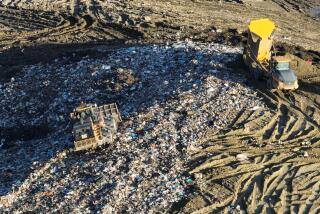Westwood Village unveils plan for smokers to snuff it and stuff it
- Share via
Attention, Westwood Village smokers. If you have puffed your cigarette to the nub and are contemplating flicking the butt to the ground, think again.
The Westwood Village Improvement Assn., which works to better the business climate in the neighborhood adjoining UCLA, has provided a place for you to snuff it and stuff it.
In partnership with TerraCycle Inc., a New Jersey recycler, the nonprofit group recently installed 15 long, gray receptacles for recycling cigarette butts.
The association invested about $1,000 in the program, the first of its kind in Los Angeles. It is aimed at taking a small step toward tackling the huge problem of cigarette waste.
“We’re trying to change behavior here,” said Andrew Thomas, the association’s executive director. “We have a lot of smokers in Westwood, for better or worse.”
And their tobacco-related refuse lies in abundance in sidewalk cracks and gutters.
Keep America Beautiful, a nonprofit group that compiles statistics from thousands of community cleanups nationwide, says cigarette butts are the most littered item in the United States and around the world. Tobacco products make up nearly 40% of all U.S. roadside trash.
Much of that litter ends up on beaches and in waterways.
Heal the Bay, an environmental group, reports that cigarette butts are the No. 1 trash item that volunteers find during beach cleanups.
The litter is unsightly, expensive to remove and dangerous to marine life.
Cigarette butts are a long-term pollution problem. Filters are made primarily of a plastic-like material called cellulose acetate. Contrary to what some smokers might believe, the material doesn’t biodegrade. Rather, filters gradually break down over many years into smaller particles that remain in the environment.
On a recent sun-gilded afternoon in Westwood, smokers and nonsmokers alike welcomed the pilot program.
“I think it’s a great thing,” said Jesse Torrilhon, 39, a nonsmoker who was surprised to learn that cigarette butts could be recycled. “Far too often you see them on the ground.”
Vincent Willems, who smokes outside on breaks at the Broxton Avenue movie theater where he is assistant manager, said he was pleased to see a bin appear on a street pole right outside the entrance. “We put out an ashtray, but some college kid made off with it,” he said.
Stephanie Bortz, 31, who teaches preschool in Venice, was skeptical. “It’s good, but are people actually going to do it?” she said. She commended the placement of a bin near the Starbucks on Weyburn Avenue, where smokers tend to congregate, but suggested that the association alert smokers through billboards or advertising at bus stops.
Albe Zakes, a spokesman for TerraCycle, said the company decided to make the bins relatively unobtrusive to encourage cities to sign on. He said participants often partner with local bars and restaurants to spread the word. (Individual smokers may also participate in TerraCycle’s butt-recycling program.)
Through TerraCycle, Santa Fe Natural Tobacco Co. covers the cost of shipping the butts.
TerraCycle, which recycles about 100 materials, including drink pouches, converts the plastic contained in cigarette butts into plastic lumber, railroad ties and shipping pallets. Organic parts of the waste — the paper and remaining tobacco — are composted.
TerraCycle is also partnering with New Orleans, St. Louis and Vancouver, Canada. Vancouver collects about 100,000 cigarette butts a month. That’s about 100 pounds of tobacco-related waste.
For every pound, TerraCycle contributes $1 toward the participating city’s choice of charity or nonprofit group and $1 to Keep America Beautiful.
Nick Palmieri, a smoker visiting Westwood from New York, applauded the idea. “People are still going to drop cigarette butts on the floor,” he said, “but it’s worth a shot.”
Twitter: @MarthaGroves
More to Read
Sign up for Essential California
The most important California stories and recommendations in your inbox every morning.
You may occasionally receive promotional content from the Los Angeles Times.











